Navigation
Install the app
How to install the app on iOS
Follow along with the video below to see how to install our site as a web app on your home screen.
Note: This feature may not be available in some browsers.
More options
You are using an out of date browser. It may not display this or other websites correctly.
You should upgrade or use an alternative browser.
You should upgrade or use an alternative browser.
Why Is Health Care In America So Fucked Up?
- Thread starter Grand Potentate
- Start date
Grand Potentate
Supporter of Possible Sexual Deviants
- Messages
- 39,182
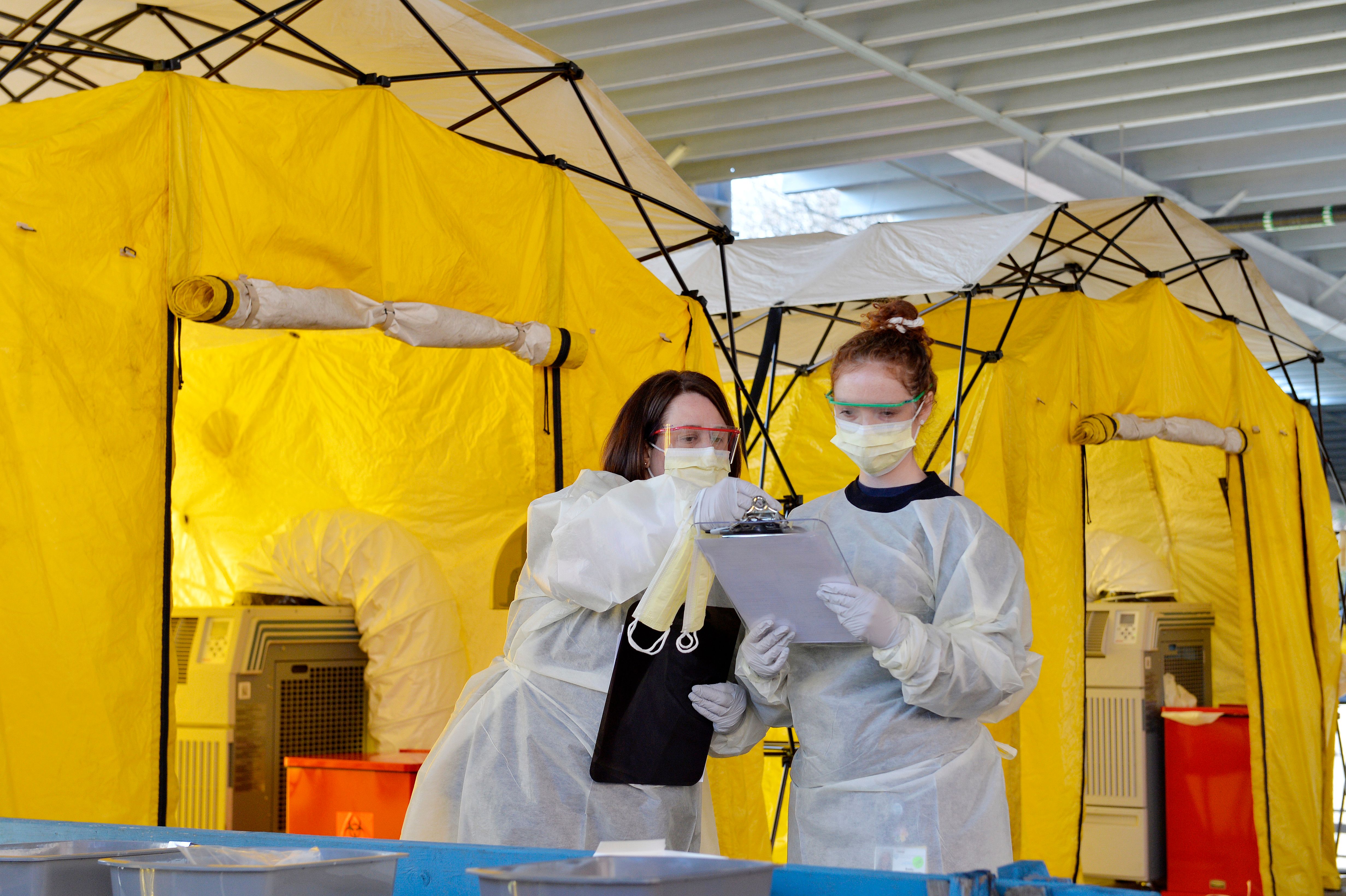
Total Cost of Her COVID-19 Treatment: $34,927.43
Getting hospitalized in the U.S. for COVID-19 may cost thousands. How much of that you'll pay depends on your insurance.
- Messages
- 4,235
i'm dying to see the two sides on this one
Those costs seem insane.
I've taken my children to the emergency room of a local, private hospital on a few occasions, mainly for potential broken bones. From memory, it's cost $190 each time and that included a physical examination, X-ray and bandaging or splinting. Admittedly, there were no complex issues such as concerns about medication or other complications that had to be considered.
I could have taken them to the emergency room of a public hospital but that's a few kilometres further away and we would have had to wait longer. However, if we'd done so, it would have been absolutely free.
Pimpernel Smith
Tone Deaf Daddy
- Messages
- 10,809
Pimpernel Smith
Journeyman
fxh i'm dying to see the two sides on this one

Total Cost of Her COVID-19 Treatment: $34,927.43
Getting hospitalized in the U.S. for COVID-19 may cost thousands. How much of that you'll pay depends on your insurance.time.com
Hence, medical insurance should be compulsory for those who work and can afford it, for those who can't the insurance is provided by the state as safety net.
Grand Potentate
Supporter of Possible Sexual Deviants
- Messages
- 39,182
no, not hence. not hence! this is the absolute worst conclusion to take away from this article. mind you, we're in the middle of a pandemic wherein half of the population can't actually work.Hence, medical insurance should be compulsory for those who work and can afford it, for those who can't the insurance is provided by the state as safety net.
sirloin
Well-Known Member
- Messages
- 1,002
If they can't work, how can they pay the medical bill for the ICU? oh.. nvm..
Pimpernel Smith
Tone Deaf Daddy
- Messages
- 10,809
no, not hence. not hence! this is the absolute worst conclusion to take away from this article. mind you, we're in the middle of a pandemic wherein half of the population can't actually work.
Someone, somewhere needs to pay for the production of all the medicines, doctors, nurses and associated services at hospitals. The NHS demonstrates that the cradle to the grave system is not that great compared to comparable nations in mainland Europe.
As regards, the current situation, then of course, there should be massive government support and intervention. You will see that in the US and elsewhere as the death tallies mount.
Grand Potentate
Supporter of Possible Sexual Deviants
- Messages
- 39,182
no, no you wont. they would rather let people die than give them healthcare.You will see that in the US
fxh
OG Party Suit Wearer
- Messages
- 8,573
I don't need to tell you that ALL of that here would be FREE to the patient.Pimpernel Smith
Journeyman
fxh i'm dying to see the two sides on this one

Total Cost of Her COVID-19 Treatment: $34,927.43
Getting hospitalized in the U.S. for COVID-19 may cost thousands. How much of that you'll pay depends on your insurance.time.com
I could do some research to estimate a cost of the episode here but it would take a while and I'm still busy.
I can tell you that in about a week The Australian (Federal)** Government will be setting up a Medicare Claim Item for COVID-19 GP run clinics. I know it will reimburse GPs about $125aud for one test. I've done a bit of work on it and its probably a fair bit above the actual cost to GPs as it likely to take less than 10 minutes. (But there extra costs, consumables, masks etc and security guards, + nurse who will do most work and possibly rooms extra away from usual waiting rooms etc.).
Edit:: I just remembered they will also grant up to $150,000 one off to the clinic for capital costs etc.
I don't have a figure but I'd estimate the lab test is in the order of somewhat less than $50aud a pop. Then there is mailing and ringing people with tests and some admin and data work.
So I'd guess that the true TOTAL cost to Gov - the single payer - is $200aud - $250aud. Not a lot more.
By next week - there will also be a Medicare reimbursement item for GPS for phone and video consults for ALL items - which doesn't exist at all now. So that will dramatically lower the number of people going to GP clinics. Thus freeing up clinics for testing etc.
** THE Australian Government here funds GPs through medicare, a time and episode based system of reimbursement) but the States fund hospitals. In my state on a Casemix - Unit Cost basis. With Capital costs separate.
Last edited:
fxh
OG Party Suit Wearer
- Messages
- 8,573
.
Pimpernel Smith
Tone Deaf Daddy
- Messages
- 10,809
Isn't the USA now covering all the costs of COVID-19/China virus medical costs?
Grand Potentate
Supporter of Possible Sexual Deviants
- Messages
- 39,182
what's your point?Isn't the USA now covering all the costs of COVID-19/China virus medical costs?
- Messages
- 12,134

UnitedHealth Reports Profit, Citing Falling Demand for Elective Care (Published 2020)
The health care insurance giant’s earnings is one of the first to offer a hint of how the health crisis is affecting the nation’s health care industry.
Grand Potentate
Supporter of Possible Sexual Deviants
- Messages
- 39,182
The new bullshit plan the democrats have come up with is to allow people who have lost their health insurance to be able to buy into the COBRA program.
Grand Potentate
Supporter of Possible Sexual Deviants
- Messages
- 39,182
Grand Potentate
Supporter of Possible Sexual Deviants
- Messages
- 39,182
remind me again which one of you assholes was attempting to argue with me about how the US system was good?
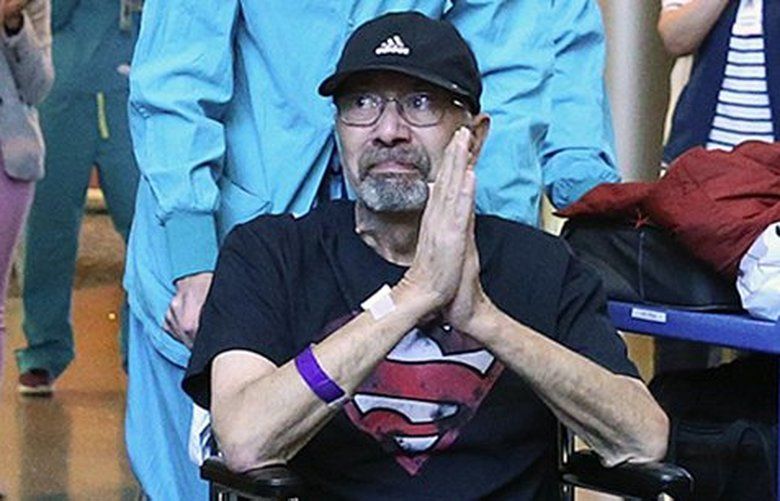
 www.seattletimes.com
www.seattletimes.com
Seattle coronavirus survivor gets a $1.1 million, 181-page hospital bill
June 12, 2020 at 4:53 pm Updated June 12, 2020 at 6:55 pm
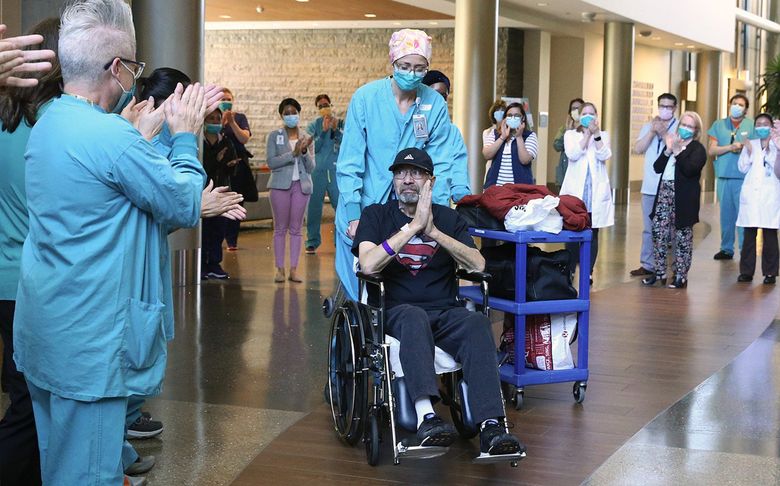
Remember Michael Flor, the longest-hospitalized COVID-19 patient who, when he unexpectedly did not die, was jokingly dubbed “the miracle child?”
Now they can also call him the million-dollar baby.
Flor, 70, who came so close to death in the spring that a night-shift nurse held a phone to his ear while his wife and kids said their final goodbyes, is recovering nicely these days at his home in West Seattle. But he says his heart almost failed a second time when he got the bill from his health care odyssey the other day.
“I opened it and said ‘holy [bleep]!’ “ Flor says.
The total tab for his bout with the coronavirus: $1.1 million. $1,122,501.04, to be exact. All in one bill that’s more like a book because it runs to 181 pages.
Michael Flor battled with coronavirus for 62 days at Swedish Issaquah. His stay makes him the longest coronavirus patient at a Swedish hospital. (Ramon Dompor / The Seattle Times)
The bill is technically an explanation of charges, and because Flor has insurance including Medicare, he won’t have to pay the vast majority of it. In fact because he had COVID-19, and not a different disease, he might not have to pay anything — a quirk of this situation I’ll get to in a minute.
But for now it’s got him and his family and friends marveling at the extreme expense, and bizarre economics, of American health care.
Flor was in Swedish Medical Center in Issaquah with COVID-19 for 62 days, so he knew the bill would be a doozy. He was unconscious for much of his stay, but once near the beginning his wife Elisa Del Rosario remembers him waking up and saying: “You gotta get me out of here, we can’t afford this.”
Just the charge for his room in the intensive care unit was billed at $9,736 per day. Due to the contagious nature of the virus, the room was sealed and could only be entered by medical workers wearing plastic suits and headgear. For 42 days he was in this isolation chamber, for a total charged cost of $408,912.
He also was on a mechanical ventilator for 29 days, with the use of the machine billed at $2,835 per day, for a total of $82,215. About a quarter of the bill is drug costs.
The list of charges indirectly tells the story of Flor’s battle. For the two days when his heart, kidneys and lungs were all failing and he was nearest death, the bill runs for 20 pages and totals nearly $100,000 as doctors “were throwing everything at me they could think of,” Flor says.
In all, there are nearly 3,000 itemized charges, about 50 per day. Usually hospitals get paid only a portion of the amount they bill, as most have negotiated discounts with insurance companies. The charges don’t include the two weeks of recuperating he did in a rehab facility.
Going through it all, Flor said he was surprised at his own reaction. Which was guilt.
“I feel guilty about surviving,” he says. “There’s a sense of ‘why me?’ Why did I deserve all this? Looking at the incredible cost of it all definitely adds to that survivor’s guilt.”
There also are special financial rules that apply only to COVID-19. Congress set aside more than $100 billion to help hospitals and insurance companies defray the costs of the pandemic, in part to encourage people to seek testing and treatment (including those with no insurance). As a result, Flor probably won’t have to pay even his Medicare Advantage policy’s out-of-pocket charges, which could have amounted to $6,000.
The insurance industry has estimated treatment costs just for COVID-19 could top $500 billion, however, so Congress is being asked to step up with more money.
The writer David Lat got a $320,000 bill for his COVID-19 treatment, and also ended up paying nothing. Yet he heard from dozens of cancer and leukemia patients who have been hit with big bills or co-pays during this same time period.
It’s like we’re doing an experiment for what universal health coverage might be like, but confining it to only this one illness.
“Suffering from the novel coronavirus as opposed to cancer shouldn’t make a difference in terms of your financial burden,” Lat wrote, in Slate. “What you pay as a patient shouldn’t depend, in essence, on whether your disease has a good publicist.”
Flor said he’s hyper-aware that somebody is paying his million-dollar bill — taxpayers, other insurance customers and so on. “Fears of socialism” have always stopped us from guaranteeing full health care for everyone, he said. But there’s also the gold-plated costs here, twice as expensive per capita as anywhere else in the world.
“It was a million bucks to save my life, and of course I’d say that’s money well-spent,” he says. “But I also know I might be the only one saying that.”

Coronavirus survival comes with a $1.1 million, 181-page price tag
The COVID-19 patient, from West Seattle, has insurance and so isn't on the hook for the vast majority of the charge. But the gold-plated cost highlights one reason why American health care is so hard to reform.
Seattle coronavirus survivor gets a $1.1 million, 181-page hospital bill
June 12, 2020 at 4:53 pm Updated June 12, 2020 at 6:55 pm

Remember Michael Flor, the longest-hospitalized COVID-19 patient who, when he unexpectedly did not die, was jokingly dubbed “the miracle child?”
Now they can also call him the million-dollar baby.
Flor, 70, who came so close to death in the spring that a night-shift nurse held a phone to his ear while his wife and kids said their final goodbyes, is recovering nicely these days at his home in West Seattle. But he says his heart almost failed a second time when he got the bill from his health care odyssey the other day.
“I opened it and said ‘holy [bleep]!’ “ Flor says.
The total tab for his bout with the coronavirus: $1.1 million. $1,122,501.04, to be exact. All in one bill that’s more like a book because it runs to 181 pages.
Michael Flor battled with coronavirus for 62 days at Swedish Issaquah. His stay makes him the longest coronavirus patient at a Swedish hospital. (Ramon Dompor / The Seattle Times)
The bill is technically an explanation of charges, and because Flor has insurance including Medicare, he won’t have to pay the vast majority of it. In fact because he had COVID-19, and not a different disease, he might not have to pay anything — a quirk of this situation I’ll get to in a minute.
But for now it’s got him and his family and friends marveling at the extreme expense, and bizarre economics, of American health care.
Flor was in Swedish Medical Center in Issaquah with COVID-19 for 62 days, so he knew the bill would be a doozy. He was unconscious for much of his stay, but once near the beginning his wife Elisa Del Rosario remembers him waking up and saying: “You gotta get me out of here, we can’t afford this.”
Just the charge for his room in the intensive care unit was billed at $9,736 per day. Due to the contagious nature of the virus, the room was sealed and could only be entered by medical workers wearing plastic suits and headgear. For 42 days he was in this isolation chamber, for a total charged cost of $408,912.
He also was on a mechanical ventilator for 29 days, with the use of the machine billed at $2,835 per day, for a total of $82,215. About a quarter of the bill is drug costs.
The list of charges indirectly tells the story of Flor’s battle. For the two days when his heart, kidneys and lungs were all failing and he was nearest death, the bill runs for 20 pages and totals nearly $100,000 as doctors “were throwing everything at me they could think of,” Flor says.
In all, there are nearly 3,000 itemized charges, about 50 per day. Usually hospitals get paid only a portion of the amount they bill, as most have negotiated discounts with insurance companies. The charges don’t include the two weeks of recuperating he did in a rehab facility.
Going through it all, Flor said he was surprised at his own reaction. Which was guilt.
“I feel guilty about surviving,” he says. “There’s a sense of ‘why me?’ Why did I deserve all this? Looking at the incredible cost of it all definitely adds to that survivor’s guilt.”
There also are special financial rules that apply only to COVID-19. Congress set aside more than $100 billion to help hospitals and insurance companies defray the costs of the pandemic, in part to encourage people to seek testing and treatment (including those with no insurance). As a result, Flor probably won’t have to pay even his Medicare Advantage policy’s out-of-pocket charges, which could have amounted to $6,000.
The insurance industry has estimated treatment costs just for COVID-19 could top $500 billion, however, so Congress is being asked to step up with more money.
The writer David Lat got a $320,000 bill for his COVID-19 treatment, and also ended up paying nothing. Yet he heard from dozens of cancer and leukemia patients who have been hit with big bills or co-pays during this same time period.
It’s like we’re doing an experiment for what universal health coverage might be like, but confining it to only this one illness.
“Suffering from the novel coronavirus as opposed to cancer shouldn’t make a difference in terms of your financial burden,” Lat wrote, in Slate. “What you pay as a patient shouldn’t depend, in essence, on whether your disease has a good publicist.”
Flor said he’s hyper-aware that somebody is paying his million-dollar bill — taxpayers, other insurance customers and so on. “Fears of socialism” have always stopped us from guaranteeing full health care for everyone, he said. But there’s also the gold-plated costs here, twice as expensive per capita as anywhere else in the world.
“It was a million bucks to save my life, and of course I’d say that’s money well-spent,” he says. “But I also know I might be the only one saying that.”
Grand Potentate
Supporter of Possible Sexual Deviants
- Messages
- 39,182
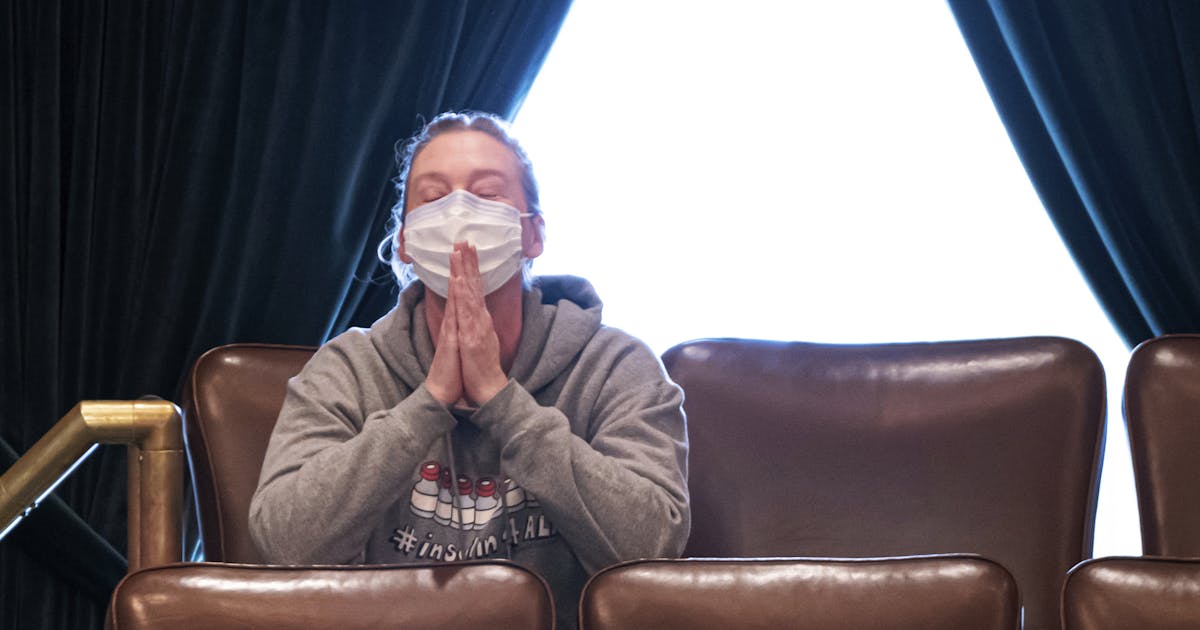
Pharmaceutical industry group sues to stop Minnesota's new insulin-aid program
Lawsuit says Minnesota's new program takes drugmakers' property without compensation.
paywalled so here is the article
Pharmaceutical industry group sues to stop Minnesota's new insulin-aid program
Lawsuit says Minnesota's new program takes drugmakers' property without compensation.
By Jessie Van Berkel Star Tribune
July 1, 2020 — 11:58pm

Glen Stubbe – Star Tribune
Nicole Smith-Holt is pictured in the Minnesota House gallery in St. Paul, Minn. on April 14, 2020. Smith-Holt pushed insulin affordability legislation inspired by her son Alec, who died because he tried to ration his insulin. A pharmaceutical industry group is suing to block the law, which takes effect on Wednesday.
A pharmaceutical-industry group is suing the state of Minnesota over its new insulin-affordability program, which took effect Wednesday.
Pharmaceutical Research and Manufacturers of America, or PhRMA, said the program the Legislature passed in April is unconstitutional and that drugmakers already offer alternatives to help people with diabetes. They are seeking a permanent injunction barring the state from enforcing the insulin act.
Lawmakers and advocates for the measure argued that the existing programs drug companies provide are insufficient. After a protracted political battle at the State Capitol, they reached a deal legislators said would ensure people struggling with the skyrocketing price of the critical drug have a low-cost resource to secure it.
The new law requires insulin manufacturers to supply the drug or reimburse pharmacies giving out insulin. Companies that fail to provide the drug face fines.
As the Legislature was working to develop the insulin program, PhRMA and some Republican lawmakers repeatedly raised concerns about its constitutionality.
“A state cannot simply commandeer private property to achieve its public policy goals,” said PhRMA’s complaint, filed Tuesday in district court. “The Takings Clause of the Fifth Amendment of the U.S. Constitution prohibits states from attempting to solve societal problems in this draconian manner.”
Gov. Tim Walz and other backers of the program gathered Wednesday to celebrate its implementation expressed frustration at the lawsuit. The Alec Smith Insulin Affordability Act was named in honor of a man who died because he was not able to afford his medication.
“In some ways this has been the playbook from big PhRMA, to fight accountability and any sense of responsibility for the welfare of Minnesotans,” said Rep. Michael Howard, DFL-Richfield.
Howard stressed the program is now “the law of the land.” Cody Wiberg, executive director of the Minnesota Board of Pharmacy, said the board has directed pharmacies to comply with the law and believes they will follow it.
Advocates will not allow the lawsuit to alter their work to push for affordable insulin for everyone, said Nicole Smith-Holt, Alec’s mother. She said the law is necessary to prevent “senseless tragedies like the death of Alec and others from occurring in Minnesota.”
Senate Majority Leader Paul Gazelka, R-East Gull Lake, echoed Howard’s disappointment over the lawsuit, particularly after legislators spent so much time working on a compromise bill.
“Senate Republicans remain committed to providing emergency insulin for those in crisis no matter what happens with this poorly timed lawsuit,” Gazelka said in a statement.
Attorney General Keith Ellison, who will represent the state in the case, said his office will defend the insulin legislation “with every resource we have.”
Grand Potentate
Supporter of Possible Sexual Deviants
- Messages
- 39,182
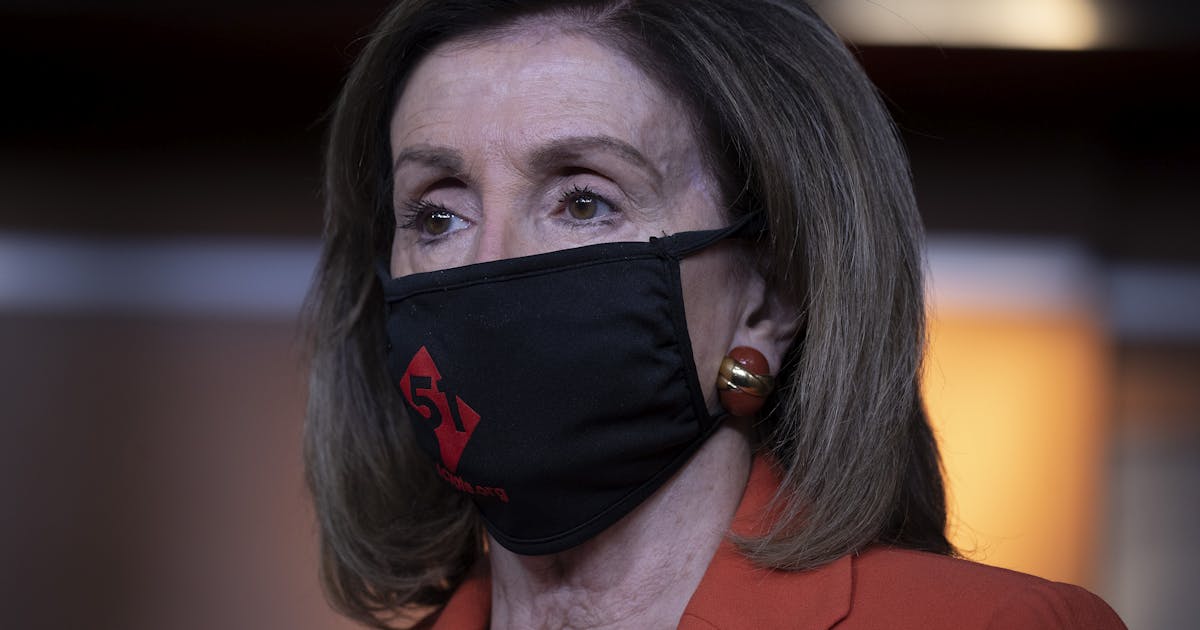
The Democrats’ Baffling Silence as Millions of Americans Lose Their Health Insurance
Five million have lost coverage amid the pandemic—a number that’s expected to triple by year’s end. But the party leadership isn’t reacting as though it’s a crisis.
Grand Potentate
Supporter of Possible Sexual Deviants
- Messages
- 39,182

Major U.S. Health Insurers Report Big Profits, Benefiting From the Pandemic (Published 2020)
Consumers are probably entitled to millions of dollars in rebates under Obamacare rules that cap companies’ profits.
Grand Potentate
Supporter of Possible Sexual Deviants
- Messages
- 39,182
this is a great piece

 www.rollingstone.com
www.rollingstone.com

Big Pharma's Covid-19 Profiteers
The race to develop treatments and a vaccine will create a historic windfall for the industry — and everyone else will pay the price.
Grand Potentate
Supporter of Possible Sexual Deviants
- Messages
- 39,182
US Tax Dollars Funded Every New Drug in the Last Decade | naked capitalism
Amid debates over costs—and profits—from a coronavirus vaccine, a new study shows that taxpayers footed the bill for every new drug approved from 2010 to 2019
Grand Potentate
Supporter of Possible Sexual Deviants
- Messages
- 39,182
Grand Potentate
Supporter of Possible Sexual Deviants
- Messages
- 39,182
UnitedHealthcare, Anthem, and other private insurers are no longer waiving telehealth copays
UnitedHealthcare, Anthem, and other insurers aren't offering full coverage for virtual visits — impacting patients, providers, and telehealth firms.
Grand Potentate
Supporter of Possible Sexual Deviants
- Messages
- 39,182

Nursing Homes Oust Unwanted Patients With Claims of Psychosis (Published 2020)
They are finding what families say are pretexts to send patients to hospitals for psychiatric care — and then refusing to let them return.
Grand Potentate
Supporter of Possible Sexual Deviants
- Messages
- 39,182
Grand Potentate
Supporter of Possible Sexual Deviants
- Messages
- 39,182
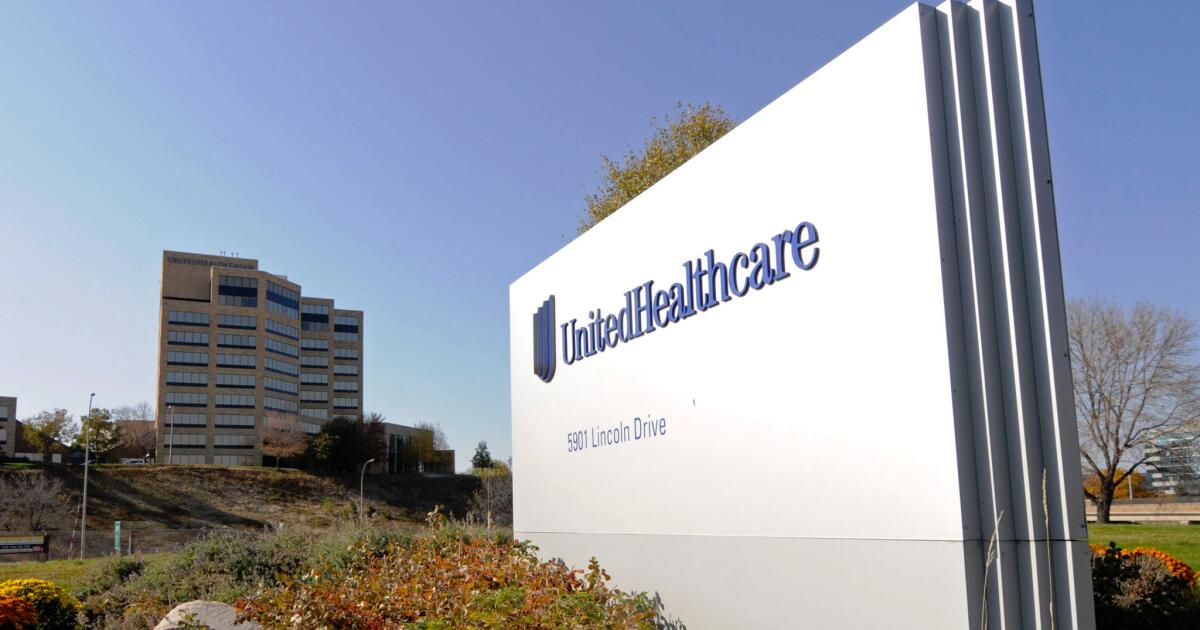
Column: UnitedHealth's profits show it's great to be an insurer during a pandemic
Even after offering policyholders cuts in premiums and copays, the nation's largest commercial health insurer still raked in over $1 billion a month.
fxh
OG Party Suit Wearer
- Messages
- 8,573

Pimpernel Smith
Tone Deaf Daddy
- Messages
- 10,809
But is this any better, the filled to the brim with Diversity Managers and other positions of the Woke bureaucratic order, the glorious NHS, relying on charities to fund their bespoke cancer treatment for teenagers:
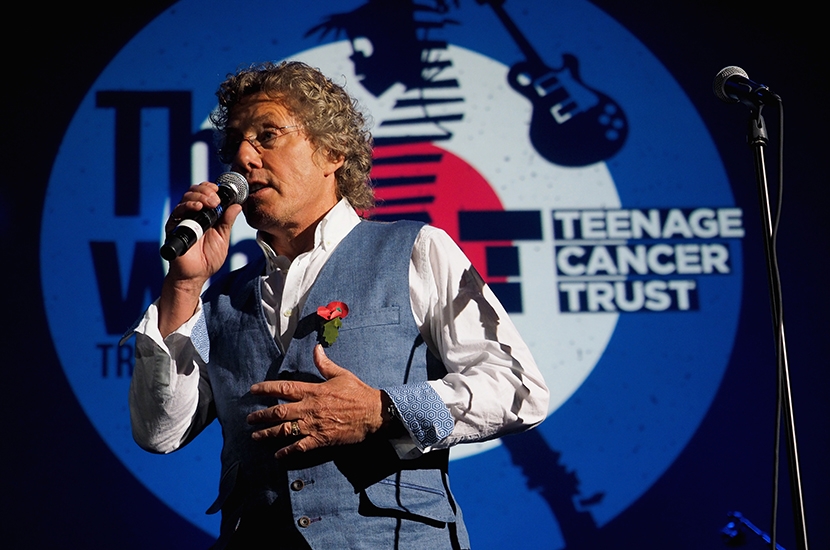
 www.spectator.co.uk
www.spectator.co.uk

Why I called Michael Gove to ask for some dosh for the teenage cancer trust
Is locking down again the right remedy for Britain, or will it only add to this country’s suffering in the long-term? It’s certainly been a disaster for many British charities — one report earlier this year estimated that there would be a £12 billion black hole in funding. And it’s been...
Grand Potentate
Supporter of Possible Sexual Deviants
- Messages
- 39,182
YesBut is this any better,
Grand Potentate
Supporter of Possible Sexual Deviants
- Messages
- 39,182

Biden Wants To Lower Medicare Eligibility Age To 60, But Hospitals Push Back
Hospitals, a powerful political force in health care, fear lowering the eligibility age for Medicare will cost them billions of dollars because federal reimbursements are less than private insurance.
Grand Potentate
Supporter of Possible Sexual Deviants
- Messages
- 39,182

Thanks to a loophole, Houston ambulance trips leave door open for high, unexpected bills
A loophole large enough for an ambulance: People call 9-1-1 in a panic, not realizing...
short version for the non-readers
Grand Potentate
Supporter of Possible Sexual Deviants
- Messages
- 39,182
and I noticed NOBODY is talking about this article on McKinsey, which really is one of the most sadistic things I've read in quite some time

 www.nytimes.com
www.nytimes.com
money shot for the non-readers:

McKinsey Proposed Paying Pharmacy Companies Rebates for OxyContin Overdoses (Published 2020)
Court filings reveal consultants’ talk of a records purge during the opioid crisis, and shed new light on sales advice given to members of the billionaire Sackler family and their drug company, Purdue Pharma.
money shot for the non-readers:
emphasis mineDocuments released last week in a federal bankruptcy court in New York show that the adviser was McKinsey & Company, the world’s most prestigious consulting firm. The 160 pages include emails and slides revealing new details about McKinsey’s advice to the Sackler family, Purdue’s billionaire owners, and the firm’s now notorious plan to “turbocharge” OxyContin sales at a time when opioid abuse had already killed hundreds of thousands of Americans.
In a 2017 presentation, according to the records, which were filed in court on behalf of multiple state attorneys general, McKinsey laid out several options to shore up sales. One was to give Purdue’s distributors a rebate for every OxyContin overdose attributable to pills they sold.
The presentation estimated how many customers of companies including CVS and Anthem might overdose. It projected that in 2019, for example, 2,484 CVS customers would either have an overdose or develop an opioid use disorder. A rebate of $14,810 per “event” meant that Purdue would pay CVS $36.8 million that year.
CVS and Anthem have recently been among McKinsey’s biggest clients. Press officers for the two companies said they had never received rebates from Purdue for customers who had overdosed on OxyContin.
Grand Potentate
Supporter of Possible Sexual Deviants
- Messages
- 39,182
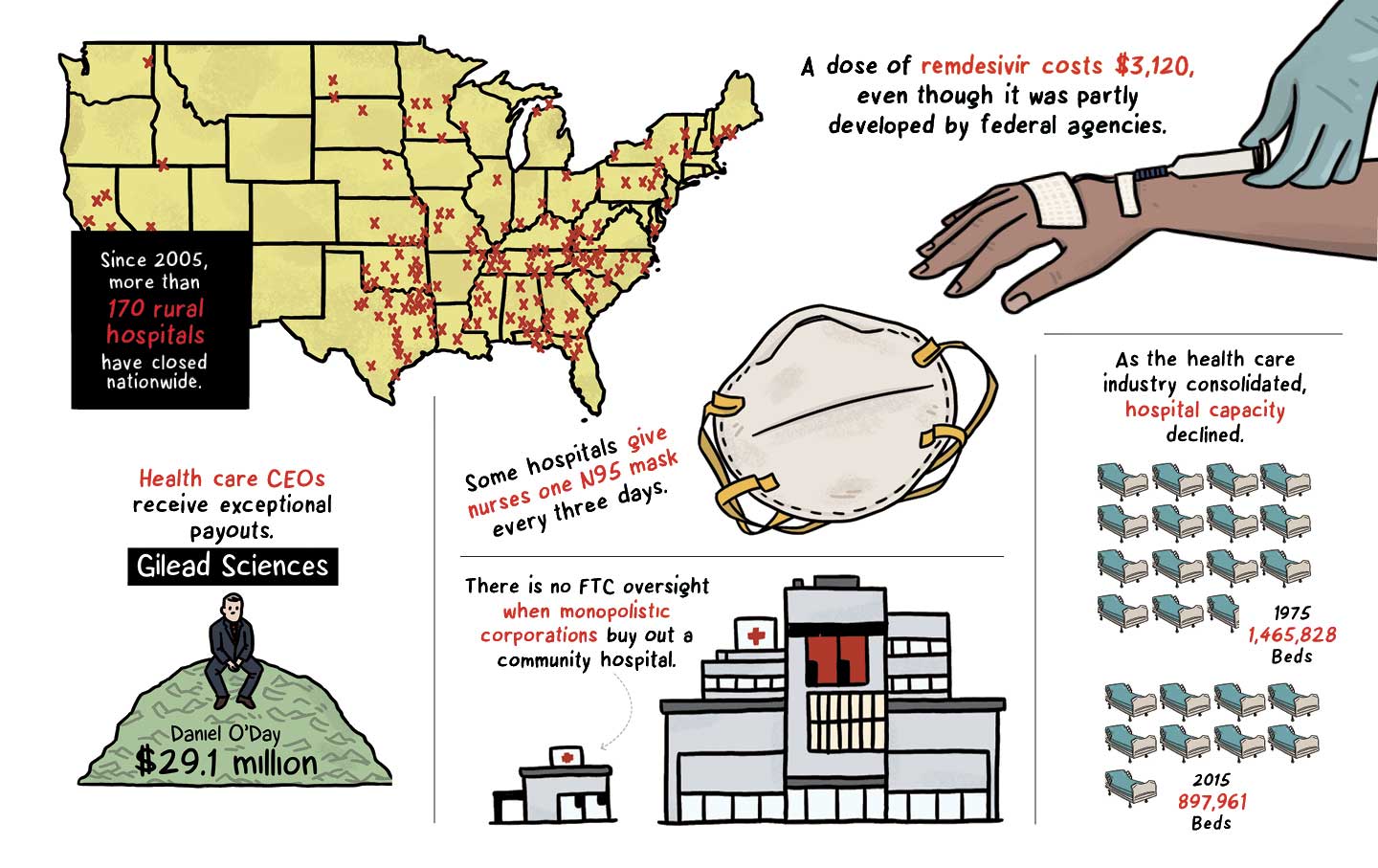
How Hospital Monopolies Broke the Health Care System
Corporate consolidation has left the US with a health care system built for profit, not people.
 www.thenation.com
www.thenation.com
Not necessarily health care though I think somewhat related. I went to the dentist and she mentioned the masks they wear at work (which look like those blue masks you see everyone wear now) have gone up 3x the normal price since the pandemic from $18 to $54. I wonder if those prices are ever going down if the pandemic ends.
Thruth
Big Winter Daddy
- Messages
- 21,706
Dentistry has been fundamentally changed wrt to PPE just as it was by HIV. Masks are most likely still going to be a thing post-vaccine.Not necessarily health care though I think somewhat related. I went to the dentist and she mentioned the masks they wear at work (which look like those blue masks you see everyone wear now) have gone up 3x the normal price since the pandemic from $18 to $54. I wonder if those prices are ever going down if the pandemic ends.
Grand Potentate
Supporter of Possible Sexual Deviants
- Messages
- 39,182

It’s Not Just You: Picking a Health Insurance Plan Is Really Hard (Published 2020)
Most Americans make poor choices. So do most professional insurance brokers, a new study finds. But robots may help.
Grand Potentate
Supporter of Possible Sexual Deviants
- Messages
- 39,182

COVID-19 pandemic making healthcare leaders billionaires
COVID-19 has helped turn dozens of healthcare leaders into newly-minted billionaires, according to a report. Fifty doctors, scientists and healthcare entrepreneurs earned billionaire status this ye…
- Messages
- 12,134
Lee Carter bringing the socialisms
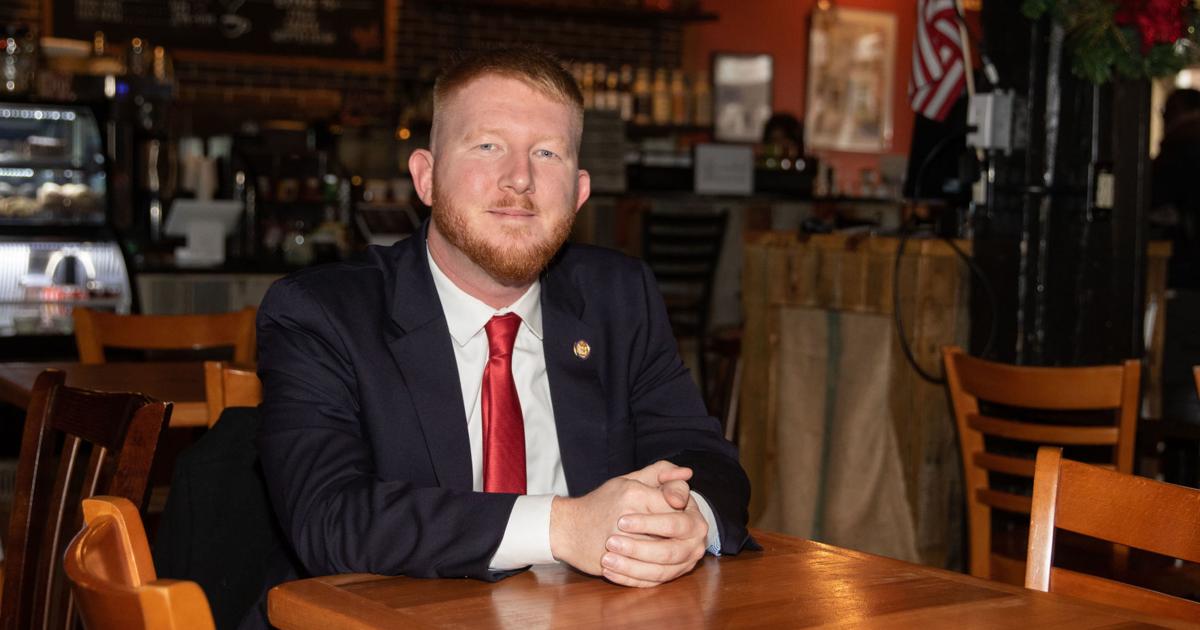
 www.princewilliamtimes.com
www.princewilliamtimes.com

New Virginia law capping insulin prices at $50 a month goes into effect Friday
Thousands of Virginians with diabetes will no longer have to worry about paying excessively high payments for life-saving insulin starting this week.
Grand Potentate
Supporter of Possible Sexual Deviants
- Messages
- 39,182
fucking christ
Grand Potentate
Supporter of Possible Sexual Deviants
- Messages
- 39,182
crossposted in the coronavirus thread
Users who are viewing this thread
Total: 2 (members: 0, guests: 2)